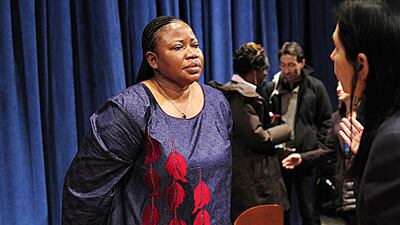The outspoken Argentine Luis Moreno-Ocampo will come to the end of his tenure as chief prosecutor at the International Criminal Court in mid-2012. His successor, Gambia's Fatou Bensouda, is likely to bring something rather different to the table, Ferry Biedermann, foreign correspondent, reports
AMSTERDAM // For a fledgling international organisation keen to establish a foothold on the international scene, change is not normally an inviting prospect.
The departure of the flamboyant Luis Moreno-Ocampo as chief prosecutor of the International Criminal Court (ICC), however, may be just what the court needs.
In its brief lifetime, the ICC has emerged as a powerful player in world affairs and much of the credit for that goes to its outgoing chief, whose nine-year term expires in June 2012. His replacement, Gambia's Fatou Bensouda, was chosen last week in New York.
Mrs Bensouda was elected by the 118 states, out of the United Nation's 193, that are signatories to the Rome Statute that set up the ICC in 2002.
The ICC's contentious involvement in Libya and Sudan, ordered by the UN Security Council, will soon become her responsibility as a prosecutor, as will a slew of other cases in Africa, which is an interesting situation for an African prosecutor. The ICC has all too often been accused of being a court used by the rich and powerful to judge those from poor and weaker countries.
Mrs Bensouda has been Mr Moreno-Ocampo's deputy since 2004 and while she has necessarily been operating in his shadow, those who know her expect she will keep a lower profile and operate more cautiously than her current boss.
And many governments as well as non-governmental groups think that may be a good thing. The ICC is controversial enough as it is due to its pursuing of those who have committed the most heinous of crimes - war crimes, crimes against humanity and genocide - and therefore could do with a bit of relative calm.
But if that is so, then it is also a reflection of the success of Mr Moreno-Ocampo in vigorously pushing the ICC's cases and giving it a face in the years after its founding. That is how Mrs Bensouda presented it in her acceptance speech after being elected.
She said the ICC "is impacting other institutions and indeed, as prosecutor Moreno-Ocampo said, changing international relations forever".
She also set out her own agenda: "I hope to contribute to solidifying this change, remaining committed to the goals of the court and the legal mandate entrusted to the prosecutor to end impunity for those responsible for the gravest offences, bringing justice to their victims, and preventing future crimes."
While they may agree on the role of the ICC, Mrs Bensouda will handle things very differently from Mr Moreno-Ocampo, said Paul Seils, a former ICC official who worked in their office and who is now vice president of the International Centre for Transitional Justice in New York.
"You can expect a very different style. They are very different personalities and I think that giving the court a different style will help it do as well in the next session as it did in the first session," said Mr Seils.
One of the priorities of the new prosecutor would be to get some convictions, of which there have been none so far, he added.
Despite his effectiveness in putting the ICC on the map, Mr Moreno-Ocampo was seen as having committed a series of flaps, the most recent to do with the jurisdiction over the trial of Libya's Saif Al Islam Qaddafi, who, along with his father and the old regime's security chief, had been indicted for war crimes by the ICC.
First Mr Moreno-Ocampo made what some considered an ill-advised trip to Tripoli, in full media glare, and then he seemed to cede the right to judge Mr Qaddafi to the new Libyan authorities while only the ICC's judges have that power. In a remarkable move, the judges quickly released a statement correcting the impression he created.
Most observers of the ICC say that by the very nature of the work of the court, the position of prosecutor will be a controversial one.
William Pace, who heads a coalition of international groups that support the ICC, said of Mr Moreno-Ocampo: "The prosecutor was a lightening rod for all sorts of controversy and criticism and he actually often enjoyed it."
The role of the ICC in the Arab world has so far been limited to Libya and Sudan, both referrals from the UN Security Council. The only Arab country that has signed and ratified the Rome Statute is Jordan. But the Palestinian Authority in 2009 told the ICC that it wished to accept its jurisdiction and the court is still examining that request.
Brigitte Chelabian, who chairs the Lebanese organisation Justice Without Frontiers, said the ICC's examination of the case of Palestine is taking too long. She contrasted it with the speed deployed in the case of Libya.
"The investigation by the office of the prosecutor was very quick and he was able to establish that war crimes had been committed and the difference with Palestine is very big. Justice cannot wait," she said.
The case of Palestine is an important litmus test for the Arab world and other regions, she said.
"This is a kind of exam for the ICC if they will be able to prosecute Israel or if they just prosecute poor countries such as the ones in Africa."

